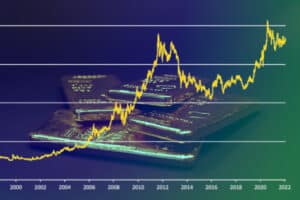As digital transactions become increasingly prevalent worldwide, the concept of a cashless society is rapidly transitioning from a futuristic idea to a present-day reality. This shift towards digital payments and cryptocurrencies has brought unprecedented convenience and efficiency to financial transactions, but it has also raised concerns about financial privacy and government control over currency.
In this evolving economic landscape, many are turning their attention to gold as a potential safeguard against the uncertainties of a fully digital financial system. Keep reading to explore how this precious metal might serve as a counterbalance to the challenges posed by an all-digital economy.
The Rise of Cashless Transactions
The journey towards a cashless society began decades ago with the introduction of credit cards in the mid-20th century. This innovation marked the first significant step away from physical currency, offering consumers a convenient alternative to carrying cash. As technology advanced, so did the methods of cashless payments.
The advent of online banking in the 1990s further accelerated this trend, allowing people to manage their finances and make transactions from the comfort of their homes. More recently, mobile payment systems have gained widespread adoption, enabling users to make purchases with a simple tap or swipe of their smartphones.
Digital Currencies and CBDCs
As the world moves further away from physical cash, the concept of digital currencies has gained significant traction. Among these, Central Bank Digital Currencies (CBDCs) have emerged as a topic of intense interest and debate. CBDCs are digital forms of a country’s fiat currency issued and regulated by the national central bank.
Unlike decentralized cryptocurrencies such as Bitcoin, CBDCs are centralized and backed by the full faith and credit of the issuing government. This gives them stability and legitimacy but also places them under direct government control. The potential implementation of CBDCs could revolutionize monetary policy, allowing for more direct and immediate economic interventions by central banks.
The Threat to Financial Privacy
While the shift towards digital transactions and currencies offers numerous benefits, it also raises significant concerns about financial privacy. In a cashless society, every transaction leaves a digital footprint, potentially allowing for unprecedented levels of financial surveillance.
This increased traceability of financial activities could lead to a loss of privacy and autonomy for individuals. Governments and financial institutions would have the ability to monitor spending habits, income sources, and overall financial behavior in great detail. For those skeptical of government overreach, this level of financial transparency represents a concerning erosion of personal freedoms and privacy rights.
Gold as a Store of Value in the Digital Age
Throughout history, gold has served as a reliable store of value, maintaining its worth across centuries and civilizations. In the face of an increasingly digital and cashless society, gold’s role as a tangible asset takes on renewed significance.
Gold’s Independence from Digital Systems
One of gold’s most compelling attributes in a cashless society is its independence from digital systems and government control. As a physical asset, gold exists outside the realm of digital networks and databases, making it immune to cyber-attacks, system failures, or digital manipulation.
This independence offers a level of financial privacy that is increasingly rare in the digital age. Transactions involving physical gold can be conducted without leaving an electronic trail, providing a degree of anonymity that is virtually impossible with digital currencies.
Gold as a Hedge Against Digital Currency Risks
In addition to privacy concerns, digital currencies and cashless systems are vulnerable to a range of risks, including technological failures, hacking, and potential government manipulation. Gold serves as a robust hedge against these digital currency risks.
As a tangible asset with intrinsic value, gold is not subject to the same vulnerabilities as digital currencies. It cannot be “hacked” or erased from existence due to a system crash. Moreover, gold’s value is determined by global market forces rather than government decree, providing a safeguard against potential currency devaluation or other forms of monetary manipulation.
Challenges and Considerations
While gold offers numerous advantages in a cashless society, integrating this ancient store of value into a modern digital economy is not without its challenges.
Liquidity and Usability
One of the primary challenges of using gold in a cashless society is the issue of liquidity and usability for everyday transactions. Unlike digital currencies, physical gold cannot be easily divided or transferred for small purchases or online transactions.
However, technological solutions are emerging to address this challenge. Gold-backed debit cards, for instance, allow users to make purchases and withdrawals in fiat currency while their account is backed by gold holdings. Gold-backed digital currencies also offer a promising solution, allowing for gold ownership with the transactional ease of digital money.
Regulatory Landscape
Another important consideration is the regulatory environment surrounding gold in a cashless society. As governments and central banks develop frameworks for digital currencies, the status of gold as an alternative or complement to these systems may come under scrutiny.
Currently, many countries have favorable policies towards gold ownership. For example, in the United States, gold coins and bullion are treated as collectibles for tax purposes, with a maximum long-term capital gains rate of 28%. In the European Union, investment gold is exempt from Value Added Tax (VAT). However, as cashless systems become more prevalent, there may be attempts to more closely regulate or monitor gold transactions to prevent tax evasion or other financial crimes.
Future regulatory scenarios could include stricter reporting requirements for gold transactions, limitations on the amount of gold that can be privately held, or even attempts to digitize all gold ownership records. These potential changes underscore the importance of staying informed about evolving regulations in the precious metals market.
Integrating Gold into a Cashless Economy
Let’s explore how gold, a traditional store of value, can be integrated into a predominantly digital economic system.
Gold-Backed Digital Currencies
One promising approach to bridging the gap between gold and digital currencies is the concept of gold-backed digital currencies. These are digital tokens or coins that are backed by physical gold reserves, combining the stability and intrinsic value of gold with the convenience and efficiency of digital transactions.
Several companies and organizations have already launched gold-backed cryptocurrencies. These currencies allow users to own and transact with gold in a digital format, with each token representing a specific amount of physical gold stored in secure vaults.
The potential for gold-backed CBDCs is also being explored by some countries. Such a system could provide a more stable and trustworthy digital currency option, addressing some of the concerns associated with purely fiat-based digital currencies.
Physical Gold Ownership in a Digital World
Despite the rise of digital alternatives, owning physical gold remains a relevant and valuable strategy in a cashless society. Physical gold offers unparalleled security and independence from digital systems, serving as a tangible store of wealth that can be accessed without reliance on technology or third-party intermediaries.
For those looking to incorporate physical gold into their investment strategy, there are several options available. Home storage is one possibility, allowing for immediate access to one’s gold holdings. However, this option comes with security risks and may not be suitable for large quantities of gold.
Gold Exchange-Traded Funds (ETFs)
Gold Exchange-Traded Funds (ETFs) offer another way to own gold in a digital format. These funds are traded on stock exchanges and typically track the price of gold. They provide investors with exposure to gold without the need to physically own, store, or insure the metal.
Gold ETFs offer several advantages, including high liquidity, low transaction costs, and the ability to buy and sell shares quickly. They also allow investors to purchase gold through traditional brokerage accounts, making them accessible to a wide range of investors.
However, it’s important to note that gold ETFs do not offer the same benefits as physical gold ownership in terms of privacy and independence from the digital financial system. They remain a digital representation of gold ownership and are subject to the same risks and regulations as other securities.
Securing Your Financial Future with Gold
As we move towards an increasingly cashless society, the role of gold as a store of value and hedge against uncertainty remains crucial. While digital currencies offer convenience, gold provides a tangible asset that exists outside of digital systems, offering privacy and protection against cyber risks.
Whether through physical ownership, gold-backed digital currencies, gold ETFs, or gold IRAs, incorporating this precious metal into your financial strategy can help safeguard your wealth in an evolving economic landscape. Silver, another precious metal, can also play a similar role in diversifying your portfolio and providing a hedge against economic uncertainties.
At Noble Gold Investments, we understand the importance of diversifying your portfolio with precious metals. Our team of experts can guide you through the process of investing in gold and silver, whether you’re interested in physical metals or a precious metals IRA. Don’t let the shift to a cashless society leave your finances vulnerable.
Contact Noble Gold Investments today at (877) 646-5347 to learn more about how you can start investing in gold, or click here to create your account now.







